Cairo, Egypt, October 20-24, 2019. The 2nd Cairo Water Week (CWW) aimed at translating the vision created during the 1st CWW into steps towards best practices and suitable implementation plans. Driven by the success of the1st Cairo Water Week, it has been decided to make the CWW an annual event.
CWW ensures knowledge transfer and how it can be acquired through successful public or private business models, political opportunities and obstacles, and capacity building needs.
Plenary Session 1: “Achieving the SDGs under Water Scarcity”
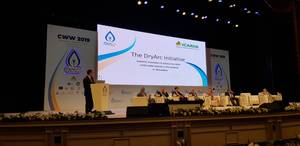 The panelists of this session brought broad perspectives to respond to the many water-related linkages across all the SDGs. In the Near East and North Africa Region, there is one major resource whose scarcity would prove the largest obstacle to the achievement of the SDGs: Water. In this region, agriculture is the major consumer of water, and makes it is easy to realize the link between SDG6 – to ‘Ensure availability and sustainable management of water and sanitation for all’ – and the SDG2 on food security, which in turn links with the SDG1 on poverty reduction.
The panelists of this session brought broad perspectives to respond to the many water-related linkages across all the SDGs. In the Near East and North Africa Region, there is one major resource whose scarcity would prove the largest obstacle to the achievement of the SDGs: Water. In this region, agriculture is the major consumer of water, and makes it is easy to realize the link between SDG6 – to ‘Ensure availability and sustainable management of water and sanitation for all’ – and the SDG2 on food security, which in turn links with the SDG1 on poverty reduction.It is evident through its links to food security, nutrition and health, rural development and growth, and the environment, that agriculture is a major driver in the attainment of the SDGs. Meanwhile, further links can also be seen with energy where the nexus between food, energy and water is one of the classic examples of water dependency. Similarly, water is strongly related to SDG11, which focuses on sustainable cities and communities.
The list could continue to show the many water-related linkages across all of the SDGs, and it is with this awareness of strong dependency on water that this session has been elaborated. Water scarcity, in fact, poses an enormous challenge in the achievement of the SDGs and more broadly the Agenda as a whole.
- How should this challenge be addressed?
- Which ‘measures’ need to be implemented, or to be enforced, in order to accelerate the achievement of the SDGs under this particularly constraining condition?
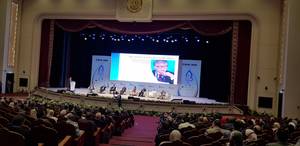 The panelists addressed different domains, spanning urban development, energy and agriculture, along with different spheres of interventions, including policy, institutions, investments and practices. Some evidence at country-level were illustrated as well.
The panelists addressed different domains, spanning urban development, energy and agriculture, along with different spheres of interventions, including policy, institutions, investments and practices. Some evidence at country-level were illustrated as well.-
Ms. Bianca Nijhof, Director of the Netherlands Water Partnership, board member of the Amsterdam
International Water Week, The Netherlands
- H.E. Mr. Mohamed AbdEl Aty, Minister of water resources and irrigation, Egypt
- Eng. Yousef Al Aitan, Ministry of the Environment and Water Resources, Jordan – ‘Sustainable Development Platform of Water & Sanitation in Jordan’
- Eng. Eweda Morshed, Chairman of the Department of Energy, Abu Dhabi, United Arab Emirates
- Dr. Felix Reinders, President of the International Commission on Irrigation and Drainage (ICID)
- Mr. Aly Abousabaa, Director-General ICARDA, ‘DryArc Initiative: Systemic innovation to achieve the SDGs under water scarcity in the drylands’
- Mr. Manuel Sapiano, Chief Executive Officer at The Energy and Water Agency, Malta
Technical Session 8: “Water productivity as the cornerstone of water-limited food production.” Monday 21/10/2019
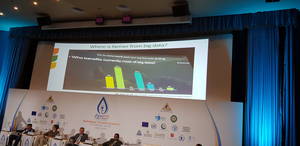 The session explored the crop water productivity gaps that could be bridged (ex. for the basis of our food basket), then analyzed the economic water productivity in light of recent social and institutional changes (ex. issues that affect WP such as access to water and water rights, sustainability, equity, changes along the value chain, the impact of food waste on WP), and finally explored how to inform the society on actions needed addressing the consumer and societal perceptions of the water needs for producing food and discussed the pros and cons of available indicators (ex. water footprint).
The session explored the crop water productivity gaps that could be bridged (ex. for the basis of our food basket), then analyzed the economic water productivity in light of recent social and institutional changes (ex. issues that affect WP such as access to water and water rights, sustainability, equity, changes along the value chain, the impact of food waste on WP), and finally explored how to inform the society on actions needed addressing the consumer and societal perceptions of the water needs for producing food and discussed the pros and cons of available indicators (ex. water footprint).- Mr. Pasquale Steduto (FAO) - moderator
- Mr. Atef Swelam (ICARDA), ‘Improving Water Productivity: options at farm level.’
- Mr. Amgad Elmahdi (IWMI), ‘Water Productivity at basin scale with water accounting and ICT Applications’
- IFPRI, ‘Options for improving economic irrigation water efficiency for sustainable agricultural development.’
Technical Session 47: Supporting Smallholders for Resilient Food Security System
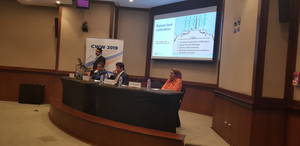 Conveners: World Food Prgramme (WFP) Egypt + Ministry of Agriculture and Land Reclamation
Conveners: World Food Prgramme (WFP) Egypt + Ministry of Agriculture and Land ReclamationSmallholders of Upper Egypt rural communities are vulnerable for many reasons, with heavy reliance on meagre income they generate from fragmented areas of land being the most prominent. The session presented what the Ministry of Agriculture and Land Reclamation has done in partnership with the WFP to support these smallholders. It presented the different interventions under this support and how these interventions helped smallholders increase their production, and thus income, and enhance the efficiency of managing their water and land resources.
The speakers included:
- Moderator: Dr. Ali Hozayen, Ministry of Agriculture and Land Reclamation.
- Dr. Ithar Khalil, WFP.- Models for successful smallholders’ support and resilience building and experiences for improved irrigation management
- Hussein Ghanem, Non-financial Services, SME group, National Bank of Egypt - Innovations for financial inclusion in agriculture and irrigation
Dedicated Social media for the Water Week
- Twitter: @ICARDA
- Facebook : https://www.facebook.com/icarda/
- Water Week Twitter account: @cairowaterweek
- Water Week Facebook page: https://www.facebook.com/cairowaterweek
- Water Week YouTube channel: CairoWaterWeek
- Water Week Instagram account: https://www.instagram.com/cairowaterweek/
#CairoWaterWeek_2019 @EUinEgypt @CGIAR #OneCGIAR@ICARDA Mr. Aly Abousabaa, Director General ICARDA: "Drylands could make up either 50% or 56%, respectively, of the Earth’s land surface by the end of this century, up from around 38% today." https://t.co/ALWSYFx0CR pic.twitter.com/HVFvt50nuG— ICARDA (@ICARDA) October 20, 2019
#CairoWaterWeek_2019 @ICARDA @CGIAR #OneCGIAR Mr. Aly Abousalaam:: "The Dry Arc Initiative is to accelerate the scaling-up of the combined knowledge of ICARDA, IWMI, ICRISAT, IITA, IFPRI, ILRI, and CIMMYT and the technology development & transfer of the NARS Research centers" pic.twitter.com/bkO5cOwrbt— ICARDA (@ICARDA) October 20, 2019
#CairoWaterWeek_2019 #CGIAR #OneCGIAR @ICARDA— ICARDA (@ICARDA) October 22, 2019
Technical Session 8: “Water productivity as the cornerstone of water-limited food production” - Dr Atef Swelam (ICARDA), ‘Improving Water Productivity: options at farm level’ pic.twitter.com/U7CrKhutNH
Positive announcement!!!— OUMAR AL-FAROUKH Brahim Mahamat (@brah_alfaroukh) October 22, 2019
E.U will be launching a multi annual flagship program called EU for water in Egypt with a total indicative budget of 20M€ in grant. The implementation is expected before the end of this year. #CairoWaterWeek_2019 pic.twitter.com/ysoHhlmjTS
Related:#CairoWaterWeek_2019 @ICARDA @CGIAR #OneCGIAR 21/10 (PS2): Dr. Elco Van Beek, Team leader Study of the Grand Ethiopian Renaissance Dam (GERD) impact on Egypt: "If filling coincides with drought there will be an average reduction of agricultural production in Egypt of 1472 M USD" pic.twitter.com/X5c67tOkSu— ICARDA (@ICARDA) October 22, 2019

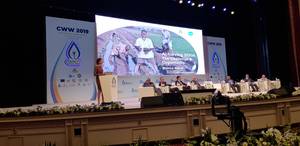
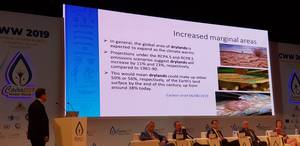
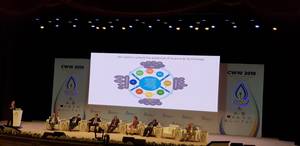
No comments:
Post a Comment